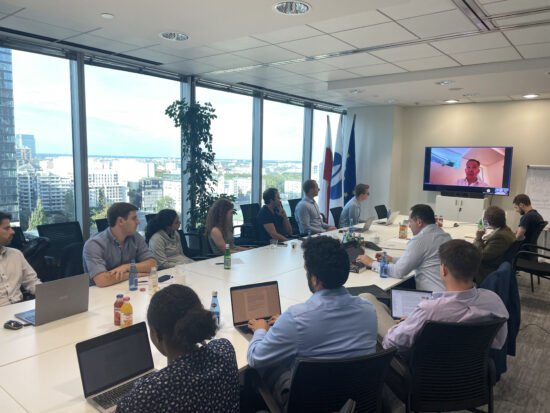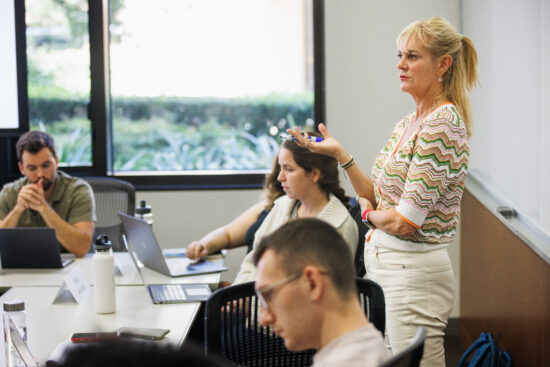Stanford Law School Launches S-Term
Small Classes Taught by VIP Lecturers Entice SLS Students Back to the Classroom Before the Start of the Regular Term
STANFORD, CA, September 26, 2023‚ÄĒ More than 85 Stanford Law School (SLS) students took advantage of the school‚Äôs new S-Term, a pilot program offered before the beginning of the regular school year. The S-Term, which was held September 11-21, allowed incoming second- and third-year students the opportunity to explore new areas of study and earn credit for no additional tuition.
S-Term students participated in one of five offered courses, all taught by ‚ÄúVIPs:‚ÄĚ Very Important Practitioners and Visiting International Professors, three of whom are SLS alumni:
- Regulation of Global Financial Markets, co-taught by Jay Clayton, former chairman of the Securities and Exchange Commission, and Sarah Payne, managing partner of Sullivan & Cromwell’s Palo Alto office and co-head of the firm’s Capital Markets Group and Technology M&A and Finance Group;
- The Business of Venture Capital, taught by Scott Kupor, JD ’96, managing partner at Andreessen Horowitz;
- The Changing Media Landscape, Free Speech and the Law, taught by Katharine Weymouth, JD ’92, former CEO and publisher of The Washington Post;
- Ukraine: The Promise and Perils of Legal Reform and Governance, in Wartime and Reconstruction, taught by Erik Jensen, director of SLS’s Rule of Law Program, and Michael Strauss, JD ’01, general counsel of the London-based European Bank for Reconstruction and Development (EBRD); and
- International Peace Negotiations, taught by Ameya Kilara, senior projects director at Inter Mediate, a London-based organization that provides strategic advice and negotiation support to heads of state and leaders of opposition groups attempting to reach political settlements.
S-Term took advantage of the September window between the end of most students’ summer jobs and the start of classes. The pilot program allowed SLS to offer small classes taught by high-profile visiting lecturers who otherwise might not be able to teach a full course during the regular term. 

‚ÄúThe S-Term was the result of faculty brainstorming over ways we can continue to innovate our course offerings and inspire the next generation of lawyers,‚ÄĚ said Jenny Martinez, the Richard E. Lang Professor of Law and Dean of Stanford Law School. ‚ÄúS-Term emerged as an ideal way to bring more international and alumni guest lecturers to campus. The program allowed our students an additional opportunity to learn directly from some of the world‚Äôs top legal practitioners, academics, judges, regulators and others, while giving them the practical advantage of accruing a few credits before the start of the school year.‚ÄĚ
A Global Focus
Subject matter with a global focus‚ÄĒwhich can include field study and international travel‚ÄĒis a centerpiece of several educational programs at SLS, including the S-Term. While not all of the S-Term courses had an international or cross-border focus, the field-study option was inspired by similarly-timed overseas study trips that SLS has offered in past years, including an international criminal justice course in the Hague. SLS students also have other opportunities for international experiences through SLS‚Äôs Global Quarter.

The 13 students who took the S-Term course on legal reform and governance in Ukraine split their time between the SLS campus and Warsaw, Poland, where guest lecturers from Ukraine’s public and private sectors joined the class to lend their experience.
‚ÄúOur course focused on the Herculean political, economic, legal, and regulatory challenges that must be confronted to manage Ukraine‚Äôs social and economic cohesion during wartime, while also looking ahead to what will be necessary to prepare for healthy and durable post-war reconstruction,” said co-instructor Michael Strauss, JD ‚Äô01. Strauss is the general counsel of the London-based European Bank for Reconstruction and Development (EBRD), the largest institutional investor in Ukraine.¬†
Jensen said the class was developed, in part, because of student demand for Ukraine-focused courses. ‚ÄúThe legal and policy issues related to Ukraine are some of the most urgent and compelling issues of our day and S-Term offered an ideal small-group forum for considering these issues,‚ÄĚ he said. ‚ÄúWe hope this truly unique course will lead to opportunities for students to participate in other projects to concretely assist Ukrainians as they strengthen their legal infrastructure.‚ÄĚ
One of the students in the Ukraine class was Alana Murphy, JD ‚Äô25, who said she found S-Term to be ‚Äúa rich, hands-on learning experience that has made my legal research and studies feel more purposeful.‚ÄĚ Murphy added that traveling to Warsaw for the second half of the course allowed her to feel closer to the conflict in the country next door and to better understand the far-reaching implications. ‚ÄúMy favorite course session was meeting with students from the University of Warsaw who have organized expansive programming supporting displaced Ukrainians in Poland. It was truly an honor to witness their drive and determination and to hear from Ukrainian students at the university dedicated to memorializing friends and classmates who have died defending their country,‚ÄĚ she said.¬†
Tackling Hot Topics
Katharine Weymouth, JD ‚Äô92, former CEO and publisher of The Washington Post, said she was ‚Äúdelighted to be part of the first S-Term at Stanford Law School‚ÄĚ and added that the opportunity was as much an educational experience for her as for her students. ‚ÄúI never would have imagined when I was an SLS student that I would one day return to campus to teach a class,‚ÄĚ she said. ‚ÄúIn fact, this is my first-ever teaching gig and the opportunity to build a class from the ground up has offered me a learning experience right alongside the students. I have really enjoyed connecting with students and talking about some of the issues I have spent my career focused on: the role of the media in an ever changing landscape; the first amendment and its limits; and the erosion of public trust in the so-called mainstream media, along with other topics.‚ÄĚ

Kara Salovaara, JD ‚Äô24, took the Changing Media Landscape class and said she enjoyed learning about Weymouth‚Äôs in-the-trenches experience with complex issues of free speech. ‚ÄúI also benefited from hearing the nuanced perspectives of other journalists and editors of large news publications who visited our class,‚ÄĚ Salovaara said. ‚ÄúOn our first day, when we got to hear from both Ms. Weymouth, and Kevin Merida, executive editor of the Los Angeles Times, I thought, ‚Äėonly at SLS!‚Äô‚Ä̬†
Gregory Schwartz, JD ‚Äô25, said he took the class, in part, ‚Äúto learn about the tension between an informed public and national security from editors who oversaw the Snowden leaks,‚ÄĚ he said. ‚ÄúThe opportunity to learn from the reporters actually making those decisions has been remarkable.‚ÄĚ
About Stanford Law School
Stanford Law School is one of the nation’s leading institutions for legal scholarship and education. Its alumni are among the most influential decision makers in law, politics, business, and high technology. Faculty members argue before the Supreme Court, testify before Congress, produce outstanding legal scholarship and empirical analysis, and contribute regularly to the nation’s press as legal and policy experts. Stanford Law School has established a model for legal education that provides rigorous interdisciplinary training, hands-on experience, global perspective, and focus on public service, spearheading a movement for change.
